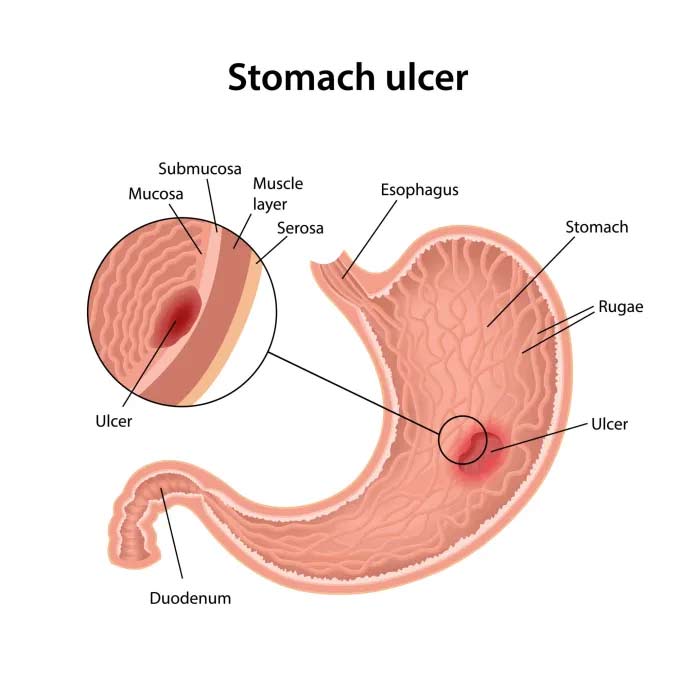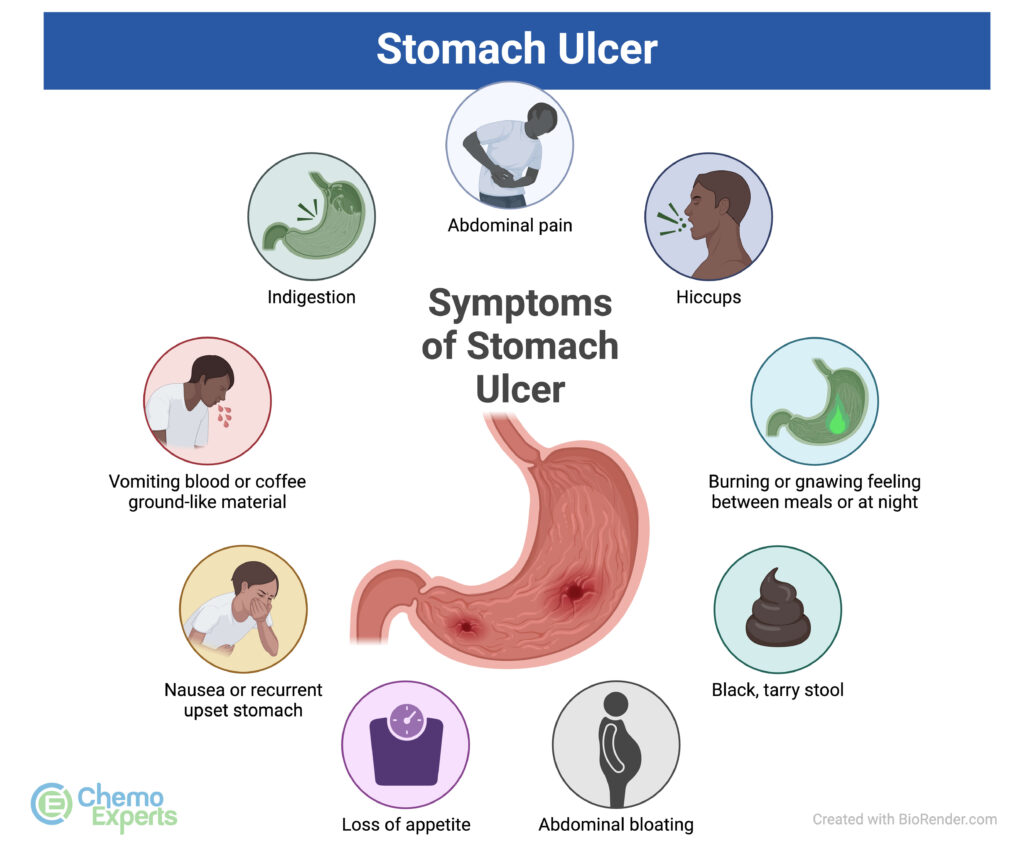Stomach ulcers, also known as gastric ulcers, are painful sores that form in the lining of the stomach. They are a type of peptic ulcer disease, which includes any ulcers affecting the stomach and small intestines. These ulcers develop when the protective mucus layer of the stomach is compromised, allowing digestive acids to erode the stomach lining. Although many stomach ulcers can be easily treated, they may become severe without proper intervention.
Causes of Stomach Ulcers
The primary causes of stomach ulcers include:
- Helicobacter pylori (H. pylori) Infection: This bacterium is responsible for approximately 80% of stomach ulcer cases. It can damage the stomach lining and disrupt the protective mucus barrier.
- Nonsteroidal Anti-Inflammatory Drugs (NSAIDs): Long-term use of NSAIDs, such as aspirin, ibuprofen, and naproxen, can lead to ulcers. These medications reduce inflammation but can also harm the stomach lining, especially when taken in high doses or for extended periods.
- Zollinger-Ellison Syndrome: Although rare (accounting for less than 1% of peptic ulcers), this condition increases acid production in the stomach, which can contribute to ulcer formation.
Other factors that may contribute to stomach ulcers include smoking, excessive alcohol consumption, and certain viral infections.
Symptoms of Stomach Ulcers
Stomach ulcer symptoms can vary in severity but typically include:
Burning Pain: The most common symptom is a burning sensation or pain in the abdomen, particularly between the chest and belly button. The pain may intensify when the stomach is empty and can last from a few minutes to several hours.
Dull Abdominal Pain: Some individuals may experience a less intense, persistent pain.
Weight Loss: Unintentional weight loss can occur due to pain-related eating avoidance.
Nausea and Vomiting: Many people with ulcers report feelings of nausea and may vomit.
Bloating and Fullness: A sensation of bloating or feeling easily full after meals is common.
Heartburn and Acid Reflux: Increased acid production can lead to heartburn, a burning sensation in the chest.
Anemia: Symptoms of anemia, such as fatigue, shortness of breath, and paler skin, may occur if there is bleeding from the ulcer.
Dark, Tarry Stools: This indicates bleeding in the digestive tract, as blood can become digested and turn black.
If you experience any of these symptoms, especially severe pain or signs of bleeding, it’s important to seek medical attention, as untreated ulcers can lead to life-threatening complications.

Diagnosing Stomach Ulcers
Diagnosing a stomach ulcer typically involves a comprehensive approach:
- Medical History Review: Your doctor will evaluate your symptoms, medical history, and any medications you’re taking.
- Testing for H. pylori: This can be done through blood tests, stool samples, or a breath test. In the breath test, you’ll consume a clear liquid, and your breath will be analyzed for increased carbon dioxide levels, indicating the presence of H. pylori.
- Imaging Studies: A barium swallow involves drinking a liquid that coats the upper gastrointestinal tract, allowing for clearer X-ray images of the stomach and small intestine.
- Endoscopy: This procedure involves inserting a thin, lighted tube through the mouth into the stomach to directly visualize any ulcers or abnormalities. A biopsy may also be taken to check for cancerous cells.
Treatment Options for Stomach Ulcers
Treatment plans for stomach ulcers vary based on the underlying cause:
Medications
- Antibiotics: If an H. pylori infection is confirmed, a course of antibiotics will be prescribed to eradicate the bacteria.
- Proton Pump Inhibitors (PPIs): These drugs, such as omeprazole and lansoprazole, block acid production in the stomach and are commonly used in ulcer treatment.
- H2 Receptor Blockers: These also reduce stomach acid production and can be used alongside PPIs.
- Discontinuing NSAIDs: If the ulcer is related to NSAID use, it’s crucial to stop these medications and consider alternatives under a doctor’s guidance.
- Bismuth Supplements: These can also help in treating H. pylori infections.
Surgical Treatment
In rare cases where ulcers do not heal, continue to bleed, or cause obstruction, surgery may be necessary. Surgical options include:
Ulcer removal: Removing the ulcer itself.
Tissue patching: Taking tissue from another part of the intestines to cover the ulcer.
Artery ligation: Tying off bleeding arteries.
Nerve supply reduction: Cutting nerves to decrease acid production.
Lifestyle and Dietary Recommendations
While diet does not cause or cure stomach ulcers, maintaining a healthy diet can support overall digestive health. It’s recommended to consume a diet rich in fruits, vegetables, and fiber. Certain foods may help combat H. pylori or promote gut health, including:
Probiotic-rich foods: Such as yogurt, sauerkraut, and kimchi.
Fruits: Berries and apples are beneficial.
Vegetables: Leafy greens and cruciferous vegetables like broccoli and cauliflower.
Avoiding spicy and acidic foods may also help reduce discomfort, especially if you have accompanying acid reflux.

Home Remedies
While not substitutes for medical treatment, some home remedies may help alleviate symptoms and combat H. pylori, including:
Probiotics: To help restore gut health.
Honey: Known for its antibacterial properties.
Glutamine: Found in foods like chicken, fish, and spinach.
Always consult with your doctor before trying home remedies.
When to Seek Medical Attention
If you suspect you have a stomach ulcer, it’s important to consult your doctor. Early diagnosis and treatment can prevent complications, including:
Bleeding: Ulcers can bleed, leading to serious health risks.
Perforation: A hole in the stomach wall can occur, requiring immediate medical attention.
Obstruction: Swelling can block food from passing through the digestive tract.
Stomach Cancer: Though rare, some ulcers may indicate malignancy.
Prevention of Stomach Ulcers
To help prevent stomach ulcers, consider the following:
Hygiene Practices: Regularly wash hands and ensure food is properly cooked to avoid H. pylori infection.
Limit NSAIDs: Use these medications sparingly and with food, and avoid alcohol when taking them.
Lifestyle Modifications: Maintain a healthy weight, quit smoking, and reduce alcohol consumption.
Conclusion
Stomach ulcers are a common but serious condition that can lead to significant health issues if left untreated. Understanding the causes, symptoms, diagnosis, and treatment options is crucial for effective management. If you experience symptoms of a stomach ulcer, consult a healthcare professional to create an appropriate treatment plan and ensure a full recovery. Taking preventive measures and leading a healthy lifestyle can significantly reduce the risk of developing ulcers in the future.
SOURCES
- https://patient.info/digestive-health/dyspepsia-indigestion/stomach-ulcer-gastric-ulcer
- https://www.healthline.com/health/stomach-ulcer




